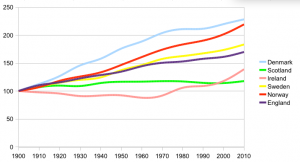The IFS report and population growth
Yesterday’s IFS report is quite interesting. It’s basically confirming that an independent Scotland will do well at first, but they have some worries about the longer-term sustainability of the Scottish economy once the oil has stopped flowing.
However, these worries are due to the fact that the IFS are simply projecting current trends into the future. Because Scotland is currently part of the UK, economic policies are broadly identical, so the only real difference between Scotland and the rUK is the projected population growth.
Basically, if two countries have similar economies, but one is growing rapidly and the other one isn’t, of course the former will end up with fewer pensioners per worker than the latter.
So what are the population projections the IFS are using?
Between 2012 and 2062, in the ONS’s ‘low migration’ projection, the population grows by 22.8% in the UK compared with 4.4% in Scotland. In addition, in Scotland, all of this population growth arises from growth in the population aged 66 and over, while in the UK there is projected to be growth in the population at all ages. The median age of the Scottish population is projected to increase by six years from 2012 to 2062 (from age 40 to age 46), compared with an increase of four years (from 39 to 43) for the UK. [p. 13f]
In other words, they think Scotland will have a static population, and probably a continuation of the current situation where dynamic young people feel they need to move south to further their careers, whereas England will grow by more than 10m people.

However, is a continuation of current trends really likely? I hear English politicians going on about the need to cut down on immigration, and I hear Scottish politicians talking about the need for more immigration here.
If an independent Scotland starts growing at a faster rate than the rUK, the fiscal gap will be smaller here in fifty years’ time than down south.
It would have been nice if the IFS had highlighted this instead of talking only about the need for higher taxes and/or lower spending.
Blog post from this morning: The IFS report and population growth http://t.co/I2sheJJMOu #indyref